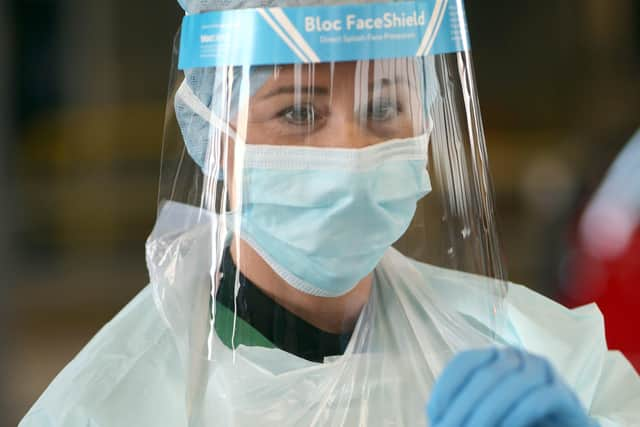Covid-19: end of PCR tests in NI, but what else is changing?
and live on Freeview channel 276
The Department of Health says the changes will deliver “a more targeted approach to test and trace, focusing on protecting those at higher risk of serious illness from Covid-19”.
What are the changes?
From the evening of Friday, April 22 you will no longer need to take a PCR test if you have Covid-19 symptoms.
Advertisement
Hide AdAdvertisement
Hide Ad

Testing sites across Northern Ireland will close from this date.
What do I do if I have Covid symptoms?
If you have symptoms you should take a lateral flow test instead.
These tests continue to be available free of charge from more 500 community pharmacies across Northern Ireland or by ordering online. Visit nidirect.gov.uk/testing from tomorrow evening to check if you are eligible.
What do I do if I don’t have symptoms?
If you do not have symptoms you are no longer advised to take a lateral flow test, unless you fall into one of the groups below.
Advertisement
Hide AdAdvertisement
Hide AdAccess to tests for asymptomatic people in the general population will cease from the evening of April 22.
* All visitors to higher risk settings - care homes, hospitals/hospices – continue to be eligible for tests and should take a lateral flow test before their visit.
* Those providing close personal care to someone in their own home, who may be at greater risk from Covid-19, are also eligible for tests. You are also eligible if your GP/healthcare professional has asked you to take a test.
* If you are eligible for Covid-19 treatments you should take a lateral flow test as soon as you develop symptoms. This group will continue to be prioritised for testing and are strongly recommended to keep a pack of lateral flow tests at home so they can test quickly should they develop symptoms.
Advertisement
Hide AdAdvertisement
Hide AdDeputy Chief Medical Officer, Dr Lourda Geoghegan, said: “While prevalence of the virus remains high, the risk of serious illness has been significantly reduced – largely due to the success of our vaccination programme and the use of new Covid-19 treatments.
“As signalled in the Department’s Transition Plan, these changes are proportionate and necessary at this stage of the pandemic.
“Transmission of Covid-19 in health and social care settings remains a risk and adds to the demands and pressures on our workforce.
“Anyone visiting friends or family in these settings should continue to take a lateral flow test before their visit.”
Is the Contact Tracing Service changing?
Advertisement
Hide AdAdvertisement
Hide AdThe Public Health Agency’s Contact Tracing Service will also change to focus on providing public health advice to positive cases and members of their household.
Those who test positive should continue to report their result. Contact tracing in the wider community will cease from April 22.
What is the new guidance on self-isolation?
Isolation guidance for household contacts is also changing. Daily lateral flow testing is no longer advised.
Household contacts are asked to be alert to symptoms and should only test if they develop symptoms.
Advertisement
Hide AdAdvertisement
Hide AdThis applies to both vaccinated and unvaccinated household contacts.
There is no change at this time to the guidance on isolation for positive cases.
Dr Geoghegan added: “At this time it is important that we focus contact tracing services to help protect those at higher risk.
“Household contacts of a positive case are at greater risk of contracting the virus. Positive cases and their households will therefore continue to be provided with the necessary public health advice.
Advertisement
Hide AdAdvertisement
Hide Ad“It also remains vital that those at higher risk and who may be eligible for Covid-19 treatments, take a lateral flow test as soon as symptoms develop, even if symptoms are mild, as treatments should commence quickly following a positive test result.
“I urge everyone to find out if they are eligible to access lateral flow tests under the new arrangements by visiting NI Direct.
“We should continue to protect those at higher risk by testing if we have symptoms and isolating if we receive a positive test result.”
Test and Trace policy will be kept under review during the ongoing period of transition up until the end of June.